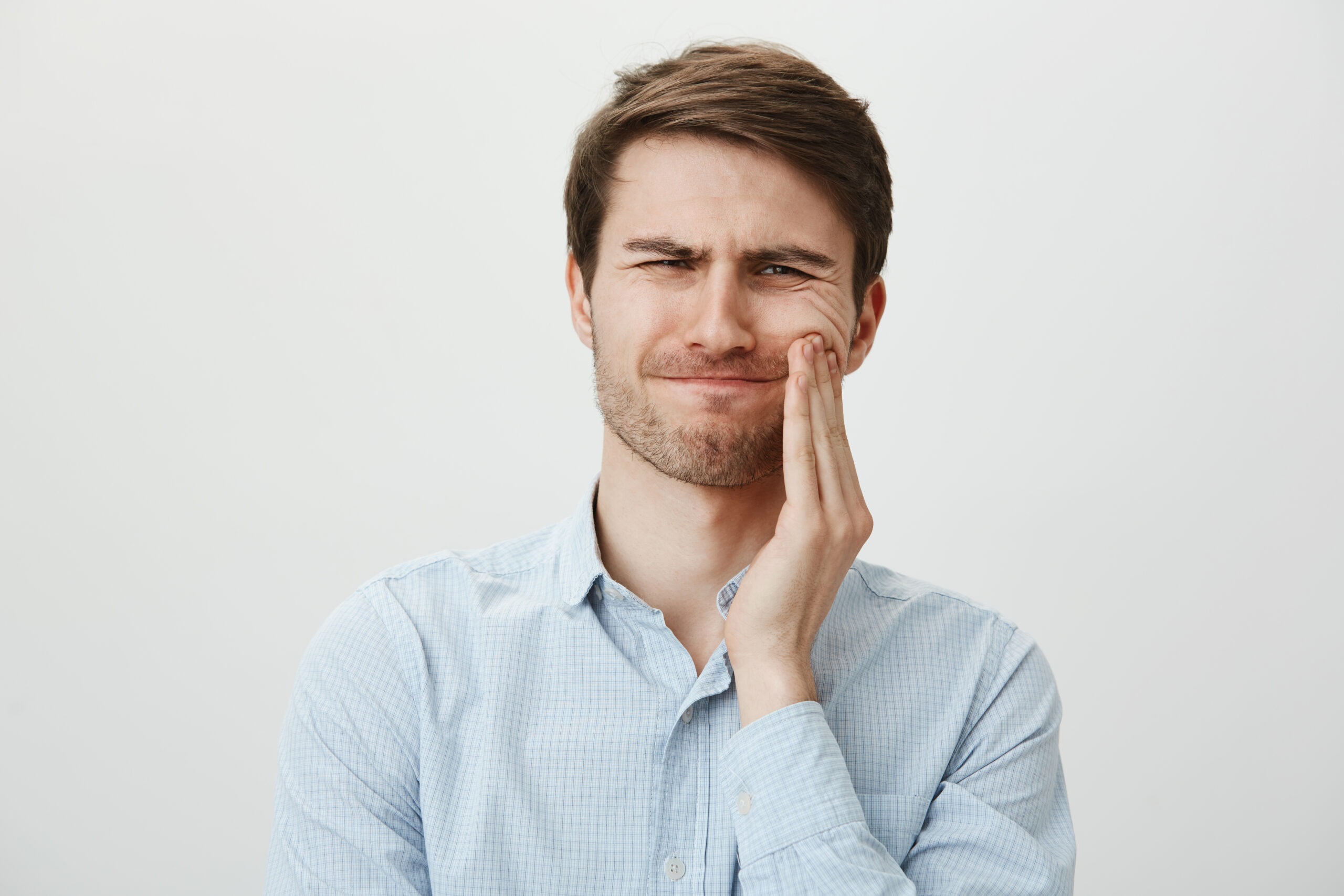Jaw pain while chewing is a common concern that can disrupt daily life. Whether it’s mild discomfort or sharp pain, it’s important to understand the potential causes and how to address them.
This guide will explore the common reasons for jaw aches during chewing and provide useful tips for managing and preventing the issue.
Common Causes of Jaw Pain When Chewing
Several factors can cause discomfort in the jaw while chewing. Let’s explore the most common causes, ranging from dental problems to jaw joint disorders.
1. Dental Issues
Dental problems are among the most common causes of jaw pain during chewing.
Tooth Decay or Abscess
Tooth decay occurs when bacteria break down the tooth’s enamel, exposing the sensitive inner pulp. This can cause sharp pain, especially when pressure is applied, such as when chewing. An abscessed tooth, which involves an infection at the root, can cause intense pain that worsens with chewing.
Gum Disease (Periodontitis)
Gum disease causes inflammation and infection in the gums, often leading to jaw pain. If untreated, the infection can spread to the jawbone, worsening discomfort while chewing.
Impacted Wisdom Teeth
Impacted wisdom teeth can also lead to jaw pain. If there isn’t enough space for these teeth to emerge properly, they can become trapped beneath the gums, leading to pain, particularly when chewing.
Misaligned Teeth (Malocclusion)
A misaligned bite (malocclusion) can cause uneven pressure on the jaw, resulting in discomfort while chewing. Malocclusion may also lead to bruxism (teeth grinding), which can contribute to jaw pain.
2. Temporomandibular Joint (TMJ) Disorders
The temporomandibular joint (TMJ) connects the jaw to the skull, and any disorder of this joint can cause pain while chewing.
Pain or Tenderness
TMJ disorders can cause pain in the jaw joint, especially when chewing or speaking. The pain can be sharp, dull, or throbbing, and may be accompanied by swelling or tenderness.
Clicking or Popping Sounds
A clicking or popping sound when moving the jaw is a common symptom of TMJ disorders. This noise occurs when the disc within the joint becomes misaligned, affecting the smooth movement of the jaw.
Limited Jaw Movement
TMJ disorders can also lead to limited jaw movement, making it difficult to chew or open the mouth fully. This can result in jaw stiffness and pain when chewing.
3. Stress and Teeth Grinding (Bruxism)
Stress is a significant factor in jaw pain, particularly through the development of bruxism, a condition where teeth are involuntarily ground or clenched, usually during sleep.
Jaw Muscle Fatigue
Bruxism leads to overuse of the jaw muscles, causing fatigue and discomfort. This can make chewing painful, as the jaw muscles are already strained from grinding or clenching the teeth.
Tooth Wear and Sensitivity
The wear caused by bruxism may increase tooth sensitivity, which can be felt more acutely when chewing. Additionally, it can lead to cracked teeth or damaged fillings, further aggravating jaw pain.
4. Sinus Infections
While sinus infections might not seem related to jaw pain, they can cause discomfort in the upper jaw, particularly during chewing.
Pain in Upper Teeth
Sinus infections cause pressure in the sinus cavities, which can radiate to the upper teeth and jaw. This pain may worsen when chewing, as the movement increases the pressure on the sinuses.
5. Arthritis in the Jaw Joint
Arthritis, especially osteoarthritis, can affect the temporomandibular joint (TMJ). This results in inflammation and pain in the jaw.
Pain and Stiffness
Arthritis in the jaw joint can lead to pain and stiffness, which worsens when chewing. This pain can make it difficult to eat or speak comfortably.
Limited Jaw Movement
The inflammation caused by arthritis may also limit jaw movement, making it harder to chew or open the mouth fully. Over time, this can lead to chronic discomfort.
Recognising Jaw Pain When Chewing
Recognising the symptoms associated with jaw pain can help identify its cause. Common signs include:
- Swelling or Tenderness: Especially around the jaw joint or gums.
- Clicking or Popping Sounds: Often indicative of TMJ issues.
- Difficulty Moving the Jaw: Limited movement when chewing or speaking.
- Headaches or Earaches: Associated with TMJ disorders or bruxism.
Treatments for Jaw Pain
Once the cause of the pain is identified, various treatments can help alleviate discomfort. Treatment options depend on the severity of the condition.
Home Remedies
For mild jaw pain, the following remedies may be effective:
- Cold or Warm Compresses: Applying a cold compress can reduce swelling, while a warm compress can relax tense muscles.
- Over-the-Counter Pain Relief: Nonsteroidal anti-inflammatory drugs (NSAIDs) like ibuprofen can help reduce pain and inflammation.
- Jaw Exercises: Gentle stretches and exercises can improve jaw mobility and reduce stiffness.
- Stress Reduction: Techniques such as meditation or deep breathing can help prevent teeth grinding.
Professional Treatments
In more severe cases, professional treatments may be required:
- Dental Treatments: Fillings, crowns, or braces may be necessary to correct dental issues like tooth decay, malocclusion, or impacted teeth.
- Physical Therapy: For TMJ disorders, physical therapy can improve jaw function and reduce pain.
- Mouthguards or Splints: These devices protect the teeth from grinding and reduce jaw muscle strain.
- Medications: If inflammation or muscle spasms are severe, muscle relaxants or anti-inflammatory medications may be prescribed.
When to Seek Medical Attention
If jaw pain persists or worsens, it is essential to seek professional help. Here are signs that you should visit a dentist or healthcare provider:
- Pain That Doesn’t Subside: If pain continues for several days without improvement.
- Severe Pain: That interferes with daily activities like chewing or talking.
- Other Symptoms: Fever, difficulty swallowing, or significant swelling may indicate a more serious condition.
Preventing Jaw Pain
Taking preventive measures can help reduce the risk of developing jaw pain:
- Good Oral Hygiene: Brush and floss regularly to avoid dental issues that lead to jaw pain.
- Manage Stress: Engage in stress-reducing activities to prevent teeth grinding.
- Avoid Hard Objects: Don’t chew on pens, ice, or hard candies, as they can strain the jaw.
- Use a Mouthguard: If you grind your teeth at night, a mouthguard can protect your teeth and jaw.
Final Thoughts
Understanding the causes of jaw pain when chewing is the first step toward effective treatment. Whether it’s related to dental problems, TMJ disorders, or stress, identifying the root cause allows for the appropriate action to be taken.
If jaw pain persists or worsens, it’s important to seek professional help. Waldron Dental is here to provide expert care for all your dental needs, offering personalised treatments and advice to alleviate your symptoms.
If you’re experiencing discomfort while chewing, don’t hesitate to contact us to schedule a consultation and get back to enjoying your meals without pain.
References













